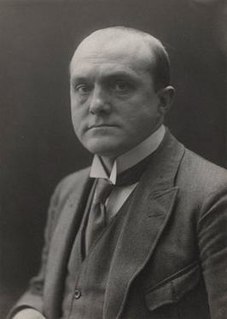A Quote by Thomas Jefferson
It is strangely absurd to suppose that a million of human beings, collected together, are not under the same moral laws which bind each of them separately.
Related Quotes
Of course it is better to emphasize the unity of human beings rather than to emphasize the diversity of forms, that is to say, the man and the woman separately. If you have separate organizations for men and women you will tend to set them apart from each other, which is what often happens at present and is absurd!
Since the whole city has one end, it is manifest that education should be one and the same for all, and that it should be public, and not private - not as at present, when every one looks after his own children separately, and gives them separate instruction of the sort which he thinks best; the training in things which are of common interest should be the same for all. Neither must we suppose that any one of the citizens belongs to himself, for they all belong to the state, and are each of them a part of the state, and the care of each part is inseparable from the care of the whole.
Human beings have rights, because they are moral beings: the rights of all men grow out of their moral nature; and as all men havethe same moral nature, they have essentially the same rights. These rights may be wrested from the slave, but they cannot be alienated: his title to himself is as perfect now, as is that of Lyman Beecher: it is stamped on his moral being, and is, like it, imperishable.
Human life is so strangely constituted that even perfected intellectual understanding combined with the richest experience is incapable of conquering innate weaknesses. Even if it thoroughly analyzes itself, psychology (and this is one of the dubious aspects of psychoanalysis) can, to be sure, recognize its flawed native characteristics, but it cannot eliminate them. Understanding (them) is not the same as overcoming (them) and, again and again, we see the wisest of human beings helpless in the fact of their small follies which everyone else observes with a smile.
All human beings are moral beings. So, certainly there are alliances. We are in the countries, that are secular states, and we obey its laws. I think we must recognize that common moral base. But in alliances we must always be careful just of what level the alliance is perceived. I will go and lecture to an atheist society, for example, but I will not lecture for them, because I am not an atheist. You see the difference.
I am personally thankful that we live together in a large moral house even if we do not drink at the same fountain of faith. The world we experience together is one world, God's world, and our world, and the problems we share are common human problems. So we can talk together, try to understand each other, and help each other.
The psyche is the inward experience of the human body, which is essentially the same in all human beings, with the same organs, the same instincts, the same impulses, the same conflicts, the same fears. Out of this common ground have come what Jung has called the archetypes, which are the common ideas of myths.
So much has to do with going beyond treating black people as cosmetic and symbolic items, as opposed to genuine personalities and human beings. And that is a deep moral and spiritual issue, which can of course be backed up by Civil Rights Commissions which enforce the laws against any form of discrimination.
If men will permit themselves to think, as rational beings ought to think, nothing can appear more ridiculous and absurd, exclusive of all moral reflections, than to be at the expence of building navies, filling them with men, and then hauling them into the ocean, to try which can sink each other fastester. Peace, which costs nothing, is attended with infintely more advantage than any victory with all its expence. But this, though it best answers the purpose of Nations, does not that of Court Governments, whose habited policy is pretence for taxation, places, and offices.

































